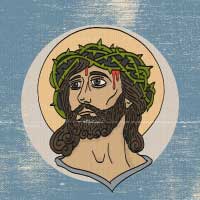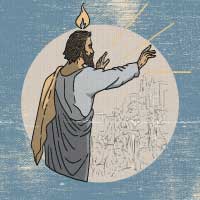
Synoptic Gospels: The Life and Teachings of Christ
(BIB 112)
This course is a study of the life of Christ from the viewpoint of the Synoptic Gospels— Matthew, Mark, and Luke. This course will help students grasp the important events in Christ’s life. It enables the student to preach and teach about Christ with greater understanding and effectiveness, and it challenges him or her to follow Christ’s personally with greater dedication and stronger devotion in service to Him.

Introduction to Hermeneutics: How to Interpret the Bible
(BIB 121)
This course will focus on the science and art of Biblical Interpretation. The aim is to foster and encourage a deeper understanding of the scriptures, as well as to engage the student in analysis and theological reflection through the use of various interpretive methods. The student will be given sample passages of Scripture to which he or she will apply the guidelines of biblical interpretation that they have learned.

New Testament Survey
(BIB 212)
An examination of the development of redemptive history throughout the New Testament in the context of its geographical and cultural background. Key themes and selected critical issues are discussed with a view to aiding students develop a biblically-informed worldview.

Old Testament Survey
(BIB 214)
This course is an introduction to the study of the Old Testament. Emphasis will be placed upon the background, structure, and content of each book. This course is a study of beginnings. It shows how the ancient inspired Hebrew writers expressed in narrative form a record of God’s saving deeds from the beginning of God’s work with all humankind. From these narratives, students can see God’s unfolding plan of redemption through what Christians believe to be God’s revelation.

Spirit-Empowered Church: An Acts 2 Ministry Model
(MIN 171)
It’s not a mystery why some churches grow, some remain stagnant, and others decline. The biblical principles for spiritual multiplication are evident in the pages of Scripture. This course points us to the heart of dynamic church growth: creating Spirit-empowered disciples who are involved in five activities—connect, grow, serve, go, and worship—to change individuals, families, and communities with the love and power of God’s mighty Spirit. Combining a strong biblical approach with inspirational insights and personal stories, Garrison shares the Acts 2 church model that can renew the spiritual vitality of your congregation. The church of Acts 2 turned the first-century world upside down for Jesus. God wants to use your church to do the same today.

Relationships and Ethics in Ministry
(MIN 181)
A biblical approach to the relationships that are important to the minister, both personally and professionally. It looks at temperament theory and its relevance to human relations. This course examines relationships and ethics in view of the minister’s personal growth, ministry challenges, people in the community, and other ministers.

Beginning Ministerial Internship
(MIN 191)
The first of three required internships. This course helps the student develop the right attitude for ministry. It examines characteristics to be avoided and tests to be passed in the life of a minister. It further focuses on public aspects of ministry, such as teaching, preaching, and leading meetings. The personal life of the minister, including time management and personal health, is also discussed.

Introduction to Pentecostal Doctrine
(THE 114)
An examination of the four cardinal doctrines of the Assemblies of God: Salvation, Baptism in the Holy Spirit, Healing, and the Second Coming of Christ are examined at length. The person, work, gifts, and ministry of the Holy Spirit are the topics examined in this biblical study. Among the questions discussed from both the Old and New Testaments are these: Who is the Holy Spirit? What is the baptism of the Holy Spirit? How do I live a Spirit-filled life? Special emphasis will be placed upon the Statement of Fundamentals of Truth of the Assemblies of God as the framework for this study.

Assemblies of God History, Missions, and Governance
(THE 142)
A study of the historical development and governing policies of the Assemblies of God. The Fellowship’s history in America and its worldwide missions program is told through stories of the personalities involved. Includes a study of the ecclesiastical structure of the Assemblies of God, with particular attention to the General Council Constitution and By Laws in relation to credentialed ministers, local churches, Ministry Networks, the General Council, and doctrines and practices that are approved and disapproved.

Introduction to Theology: A Pentecostal Perspective
(THE 211)
A study of bibliology—the doctrine of Scripture, with a focus on the nature of revelation and the inspiration and authority of Scripture and the development and transmission of the canon; Theology Proper—the doctrine of God’s existence, attributes, works, and the Trinity; Christology—the theology of the Person and work of Jesus Christ, including consideration of His names, nature, offices, humiliation, atoning death, resurrection, and exaltation; Anthropology— the theology of the human condition (origin, nature, and fall); and soteriology—the divine plan of salvation (regeneration, justification, adoption, sanctification, and deliverance) for the believer.


